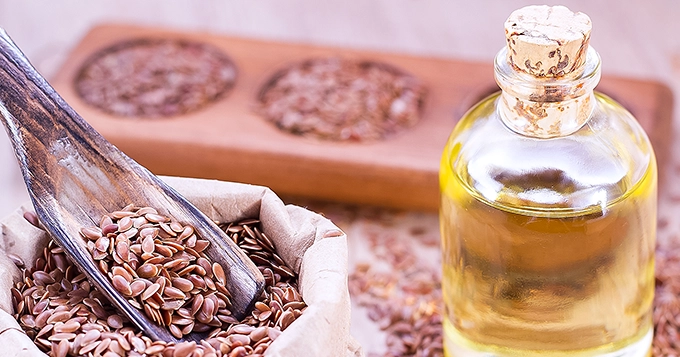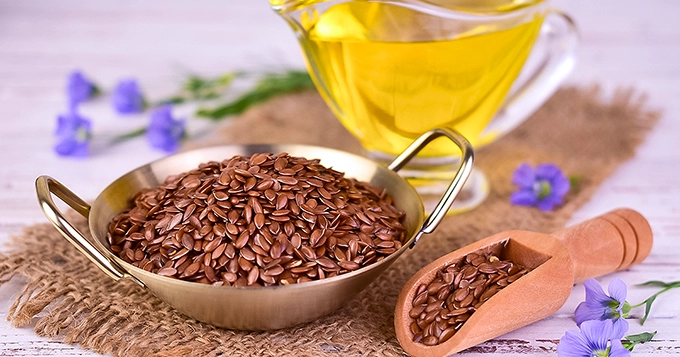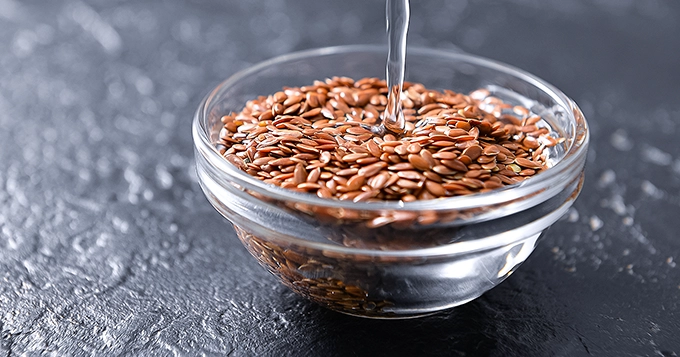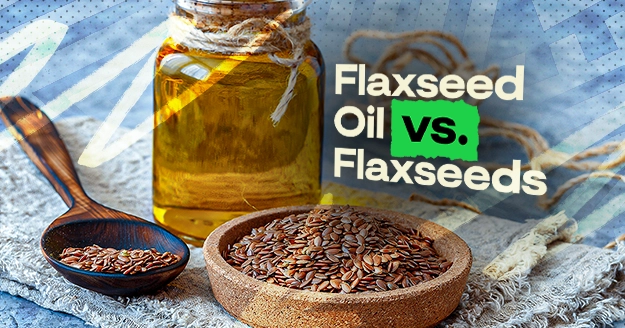Flaxseeds and flaxseed oil are gaining recognition for their nutritional prowess. These food wonders are packed with nutrients and health benefits.
You can use flaxseed as it is (whole), crushed, or in powder form. You can also purchase flaxseed oil in liquid and capsule form.
But which one is better? Let’s break it down in this article.
Comparing Flaxseed and Flaxseed Oil
- Flaxseed is a whole food, flaxseed oil is not.
- You can use flaxseed in different ways – whole, crushed, or as a powder like meal or flour. Flaxseed oil can come in liquid or capsule form.
- Flax seeds are considered healthier because they have more vitamins and nutrients compared to flaxseed oil.
- Compared to flaxseed oil, flaxseeds are higher in fiber and high in minerals like manganese, copper, and magnesium, as well as vitamins like folate and B6.
- Flaxseed oil is a fantastic concentrated source of omega-3 fatty acids, especially ALA. It contains a higher concentration of ALA than flaxseeds.
Flaxseed Oil Benefits
- It might reduce cancer cell growth
There have been several studies conducted in test tubes and with animals suggesting that consuming flaxseed oil might prevent cancer cells from multiplying, However, more research is needed to confirm these findings in humans.
- It can improve heart health.
Studies suggest that flaxseed oil is good for your heart because of its high omega-3 fatty acid content.
One study compared flaxseed oil to safflower oil in 59 people. After taking one tablespoon of flaxseed oil for 12 weeks, participants had lower blood pressure compared to those taking safflower oil.
Flaxseed oil can also make arteries more elastic.
- It can help treat constipation
In an animal study, flaxseed oil showed it can help with constipation and also work as an anti-diarrheal agent.
Constipated patients on hemodialysis found that after four weeks of taking flaxseed oil, there were more regular bowel movements and better stool consistency.
However, most research on flaxseed oil’s effects on constipation and diarrhea has been done in animals or people with specific conditions. We still need more studies to see how well it works for everyone.
- Can improve skin health
Research, both in animals and humans, suggests that taking flaxseed oil as a supplement can make your skin smoother and more hydrated. It might even help with skin conditions like dermatitis.
A small study with 13 women found that after taking flaxseed oil for 12 weeks, their skin became smoother and more hydrated, with less sensitivity to irritation and roughness.
In an animal study, mice with dermatitis showed improvements after three weeks of receiving flaxseed oil, experiencing less redness, swelling, and itching.
- Reduce inflammation
Research suggests that flaxseed oil, with its omega-3 fatty acids, might help reduce inflammation in certain groups of individuals. It reduced inflammation, as measured by C-reactive protein, in obese individuals. C-reactive protein is a marker used to measure inflammation.Walking for 30 minutes a day or more on most days of the week is a great way to improve or maintain your overall health.
There’s also been a comparison between flaxseed oil to olive oil, showing similar anti-inflammatory effects.
Flaxseed Benefits
- Rich in various nutrients
One of flax seeds benefits is that it is rich in nutrients. One tablespoon or 7 grams of ground flaxseed contains:
- Calories: 37
- Carbs: 2 grams
- Fat: 3 grams
- Fiber: 2 grams
- Protein: 1 gram=8uMixing flax seeds in glass of water
- Thiamine: 10% of the Daily Value (DV)
- Copper: 9% of the DV
- Manganese: 8% of the DV
- Magnesium: 7% of the DV
- Phosphorus: 4% of the DV
- Selenium: 3% of the DV
- Zinc: 3% of the DV
- Vitamin B6: 2% of the DV
- Iron: 2% of the DV
- Folate: 2% of the DV
- Rich in fiber
A single tablespoon of ground flaxseed provides about 5% of the daily recommended intake for men and 8% for women.
Additionally, flaxseed contains two types of fiber—soluble and insoluble. The bacteria in your intestines ferment these fibers. They promote gut health and enhance regular bowel movements.
Soluble fiber in flaxseed absorbs water in your intestines, which slows down digestion and helps regulate blood sugar levels and lower cholesterol. On the other hand, insoluble fiber adds bulk to the stool. It prevents constipation and supports regular bowel movements.
- Can lower cholesterol levels
Flax health benefits just keep going. This seed has been shown to help lower cholesterol levels.
In a one-month study with people having peripheral artery disease, consuming 4 tablespoons (30 grams) of milled flaxseed daily decreased LDL (bad) cholesterol by 15%.
Another 12-week study with 112 individuals having high blood pressure found that the same amount of flaxseed led to significant reductions in BMI, total cholesterol, and blood pressure.
- Reduce blood pressure
Flaxseed is known for lowering blood pressure levels. A review of 15 studies found that using flaxseed products, like flaxseed powder, significantly decreases both systolic and diastolic blood pressure.
According to an 11-study review, consistently taking flaxseed for over 3 months can lower blood pressure by 2 mmHg. Yes, it might not sound like much. However, reducing blood pressure by 2 mmHg can lower the risk of stroke by 14% and coronary heart disease by 6%.
- Can stabilize your blood sugar levels
Flaxseed can help maintain stable blood sugar levels, especially for those with type 2 diabetes. Flaxseeds are rich in soluble fiber, known to lower blood sugar and prevent insulin resistance.
Conclusion
Flax seeds and flaxseed oil are both healthy foods, but they serve different purposes. If you want to incorporate more nutrients into your diet, choose flax seeds. Flaxseed oil, on the other hand, can be seen as a supplement to help people increase their intake of omega-3s if they’re not getting enough from their regular diet. So, it’s really not a matter of choosing between the two – they both have unique benefits.








